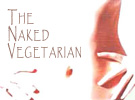The body politic

Contemplating this season's emphasis on the Presidential race with its' subsequent politicization of everything from soup-to-nuts it occurred to us that it would be interesting to briefly trace the history of politics and vegetarianism.
History is fraught with references that link religion (read that politics) in the ancient world and vegetarianism beginning with the food of the Gods, "Ambrosia", a legendary blend of honey with coconut, and encompasses virtually every major religion.
Pythagoras, the Greek mathematician, was a vegetarian (vegetarians were called Pythagoreans up until the 1800s) as was the poet Percy Byce Shelley, a fervent detractor of social political patronage. George Bernard Shaw, socialist reformer, playwright and public critic, was a vocal proponent of a meat-free diet and the list of notable vegetarians both famous and infamous throughout history is nearly endless.
Society's vegetarian origins date back much farther than one might suspect. Western history depends largely on scholarly interpretation of texts relating to ancient eastern mythology and religion. Christianity has been said to have its' origins linked to the grace in abstinence from a meat diet and evidence suggests that Jesus was a vegetarian. It is commonly believed, if only partially true, that Buddhists are vegetarians. Buddhists believe in reincarnation and therefore, logically, it would be impractical to eat animal flesh since the soul of a human may inhabit an animal.
An argument for vegetarianism in Buddhism comes from the following text in the "Udana" in which Buddha recounts a parable of self love:
I have heard that on one occasion the Blessed One was staying near Savatthi, in Jeta's Grove, Anathapindika's monastery. Now at that time King Pasenadi Kosala was together with Queen Mallika in the upper palace. Then he said to her, "Is there anyone more dear to you than yourself?"
"No, your majesty," she answered. "There is no one more dear to me than myself. And what about you, your majesty? Is there anyone more dear to you than yourself?"
"No, Mallika. There is no one more dear to me than myself."
Then the king, descending from the palace, went to the Blessed One and, on arrival, having bowed down to him, sat to one side. As he was sitting there, he said to the Blessed One: "Just now I was together with Queen Mallika in the upper palace. I said to her, 'Is there anyone more dear to you than yourself?'
"'No, your majesty,' she answered. 'There is no one more dear to me than myself. And what about you, your majesty? Is there anyone more dear to you than yourself?'
"'No, Mallika. There is no one more dear to me than myself.'"
Then, on realizing the significance of that, the Blessed One on that occasion exclaimed:
Searching all directions
with one's awareness,
one finds no one dearer
than oneself.
In the same way, others
are fiercely dear to themselves.
So one should not hurt others
if one loves oneself.
Vegetarianism since the 1800s has enjoyed a much less distinguished place in history being largely over-shadowed by the economic growth experienced during the industrial revolution. Subsequent advances made to modern farming technologies have made meat an affordable resource to so many during the later half of the twentieth century that today it has become a standard, widely held opinion that meat is necessary rather than an option to sustain life; omnivorous has come to mean that because we can eat almost anything, we are obligated to eat everything. Mass marketing and the ease of expanded international trade have combined to create a global standard, if not enjoyed universally, at least recognized; everyone shares the same understanding of fast food.
Political choices being what they are today few would describe the economics of diet as political fodder and so there will not likely arise any time soon a political party of Vegetarians - any more than there could be a party of Catholics or Fortune 500 executives, and yet those are exactly the groups, along with many others, that establish political values and dictate the evolution of politics and society.
PACS or political action committees are increasingly successful in prosecuting their minority agendas, but those goals are usually limited in scope and short term at best; electing a particular candidate, or passing some measured legislation are typical PAC incentives.
The current rock tour Vote for Change is sponsored by MoveOn PAC, the newest take on American political activism. Featuring a score of popular rockers in what may be prove to be the highlight of this year's elections, Move On has captured the essence of political populism by addressing the WIIFM; what's in it for me? aspect of electioneering; folks wanting to effect change in their government banding together for a "feel good" event of hard rock and soft politics. If you have not seen the tour the final concert will be aired this coming Monday Oct. 11th on the Sundance Channel.
There have been PACS for vegetarian causes as well, in fact one could say that IUV, the International Vegetarian Union to name just one group is such a PAC. Political action to vegetarianism is precisely the same as action to any cause, it must address the what's-in-it-for-me issue. Today, and for the first time in history, that question may have a clear answer: public health. Mad cow, avian flu, outbreaks of salmonella, foods irradiated and dehydrated, "franken-food" and food spiked with additives: hormones and anti-oxidants. The landscape is prime for a vegetarian body politic; human survival for the long term might well turn on that question public health and our ability to feed ourselves given the limits of earth's sustainable biomass.












<< Home